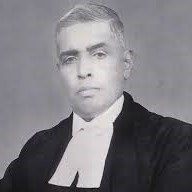Radha Binod Pal

Radha Binod Pal was born on January 27, 1886, in the small village of Salimpur in the Bengal Presidency. He lost his father at an early age and, while grazing cows, would listen to lectures from outside a local primary school. One day, he impressed a school inspector with his wisdom, leading to his admission to the school and a stipend. For further education, Pal went to Calcutta, studying mathematics at Presidency College and law at the University of Calcutta’s Law College.
Pal made significant contributions to the Indian Income Tax Act of 1922 and was appointed as a legal advisor in 1927. After World War II, the Allies initiated the Tokyo Trial to prosecute fifty-five Japanese war criminals, including Prime Minister Tojo. Justice Pal was nominated by the British Indian Government to represent British India at the trial. While the other eleven judges found the Japanese guilty, Pal was the sole dissenting judge who exonerated all suspects. In his 1235-page dissenting judgment, he highlighted the Allies’ violations of international law and mentioned the nuclear bombardment that killed millions of Japanese. His arguments helped reduce the charges against many accused.
After the trial, Pal was elected to the United Nations’ International Law Commission, where he served from 1958 to 1966. In 1959, he was awarded the Padma Vibhushan, and the Emperor of Japan conferred one of their highest civilian honors upon him.
Trivia : There is a statue of Radha Binod Pal in front of the Supreme Court of Tokyo.
References:
- Radha Binod Pal: The Story of a Jurist India Disowned - The Leaflet
- Radha Binod Pal: The Forgotten Indian and the Japanese Hero - Live Mint